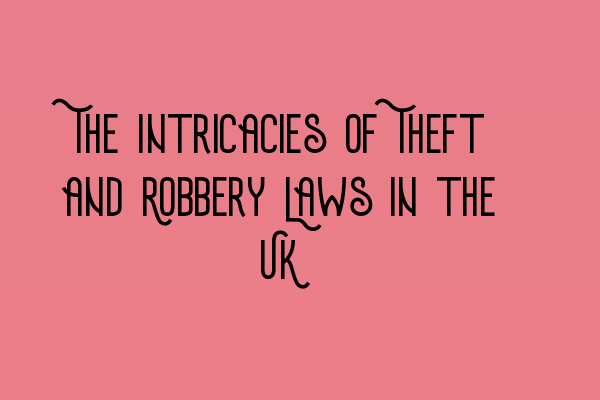The Intricacies of Theft and Robbery Laws in the UK
Welcome to the SQE Criminal Law & Practice Law UK blog! Today, we’re going to explore the fascinating world of theft and robbery laws in the United Kingdom. Whether you’re a law student preparing for the SQE exams or a legal professional looking to deepen your understanding, this article will provide valuable insights into the complexities of these criminal offenses.
Understanding Theft
Theft is a serious offense that involves dishonestly appropriating someone else’s property with the intention of permanently depriving them of it. It is crucial to distinguish theft from other similarly related offenses, such as handling stolen goods or fraud. If you’re preparing for the SQE 1 exams, our SQE 1 Practice Exam Questions will help you test your knowledge on this topic.
In the UK, the act of theft is covered under the Theft Act 1968, which outlines various elements necessary to establish the offense of theft. These elements include an appropriation of property, belonging to another, dishonesty, and an intention to permanently deprive the owner of the property. Each element plays a critical role in determining whether an individual is guilty of theft.
Examining Robbery
Unlike theft, which involves taking someone’s property without using force or the threat of force, robbery is a more severe offense that includes the element of force. Robbery is defined as the unlawful taking of property from a person or their immediate presence, using force or the threat of force. It is crucial to note that the property must be taken directly from the victim’s person or within their immediate reach.
In order to establish the offense of robbery, the prosecution must demonstrate not only the act of theft but also the use or threat of force. This additional element significantly impacts the severity of the offense and the corresponding legal consequences. To gain a deeper understanding of the elements required to prove robbery, consider reviewing our article on SQE 2 Preparation Courses.
Penalties and Legal Consequences
Both theft and robbery are criminal offenses that carry serious penalties and legal consequences in the UK. The severity of the penalties depends on various factors, including the value of the property stolen, the extent of force used, and the defendant’s previous criminal record. It is crucial to seek legal advice or representation if you find yourself facing charges related to theft or robbery.
The Crown Court typically has jurisdiction over robbery cases and has the authority to impose custodial sentences based on the specific circumstances of each case. Sentences can range from fines to lengthy prison terms, depending on the gravity of the offense. For more information on the legal consequences and potential penalties for theft and robbery, be sure to check out our SRA SQE Exam Dates article.
Conclusion
Theft and robbery are complex criminal offenses that require a thorough understanding of the intricacies of the law. As aspiring legal professionals, it is essential to familiarize ourselves with the elements, penalties, and legal consequences associated with these offenses. Whether you’re preparing for the SQE exams or seeking to expand your legal knowledge, our SQE 1 Practice Mocks FLK1 FLK2 and SQE 2 Preparation Courses can provide valuable resources to enhance your understanding.
Thank you for reading this comprehensive overview of theft and robbery laws in the UK. We hope this article has shed light on the intricate nature of these offenses and their implications under the British legal system. Stay tuned for more informative articles from SQE Criminal Law & Practice Law UK!
